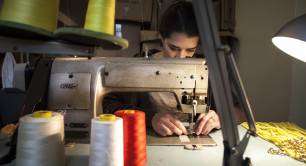Fears for future of social cooperatives in Italy as Covid-19 hits hard
Impact investor network Social Impact Agenda per l’Italia is calling on the Italian government to offer specific support for social enterprises and nonprofits so they can help Italy’s communities get through the Covid-19 crisis.
The network’s secretary-general Raffaella DeFelice told Pioneers Post that this request was “not because they’re special, but because in that sector you have an incredible pool of skills and competence for addressing this crisis.”
More than 11,000 people in Italy have died of the coronavirus to date – more than in any other country. The government first introduced lockdown measures on 9 March.
As a result many social enterprise and nonprofit leaders are finding their hands tied. “They cannot fundraise, they cannot deliver services,” said DeFelice, who expressed serious concern that a significant number of organisations would soon need to close as a result.
Italy has an estimated 102,000 social enterprises – over 15,000 of them classed as social cooperatives – which employ around 900,000 paid workers, according to 2017 figures from the social economy research specialist Euricse.
'The social sector in Italy can count on a very good network, but it needs the attention of the government'
“The social sector in Italy can count on a very good network, so probably we will be able to create structured, strategic initiatives,” she said. “But surely it needs the attention of the government. Right now, we’ve heard nothing.”
Vincenzo De Bernardo, director of Rome-based Confcooperative Federsolidarietà – which represents 6,250 social cooperatives, social enterprises and associations – told Pioneers Post by email that the crisis offered an opportunity “to think about innovation and what people really need”. Many cooperatives have adapted their services to meet new demands: in Milan, for example, several have started residences for children whose parents have been hospitalised with the virus.
Some 90% of cooperatives have contracts with Italian public sector organisations, who are now considering stopping those contracts to shore up their own cash flow, De Bernardo said. He is hoping cooperatives can renegotiate such agreements so that some services can be delivered remotely instead of face to face, but he fears that a loss of income will lead to many cooperative employees becoming the “new working poor”.
Among the funders to have stepped in is Acri, an association of Italian foundations of banking origin, which has created a €5m guarantee fund to support third sector organisations, expected to help leverage “tens of millions of euros” of loans. The association has also allocated €35m to hospitals and healthcare companies.
Italian foundations Fondazione CRT and ISI Foundation, together with The GovLab, have launched a call for more availability and use of data to tackle the current global emergency.
At Pioneers Post we're working hard to provide the most up-to-date information and resources to help the social business movement get through the Covid-19 crisis – and your support can help us to continue. We rely on paid subscriptions and partnerships to sustain our purpose-led journalism – so if you think it's worth having an independent, specialist media platform for the sector, please consider subscribing.
Header photo: a seamstress at Progetto Quid, a social cooperative created in 2012 which upcycles unwanted textiles to produce handcrafted clothes and accessories.



